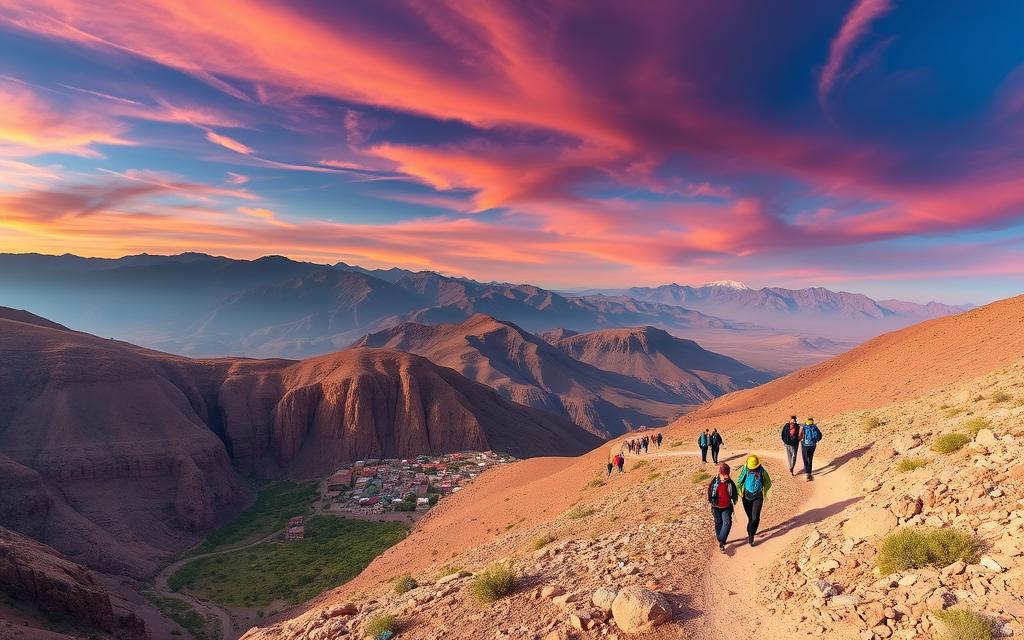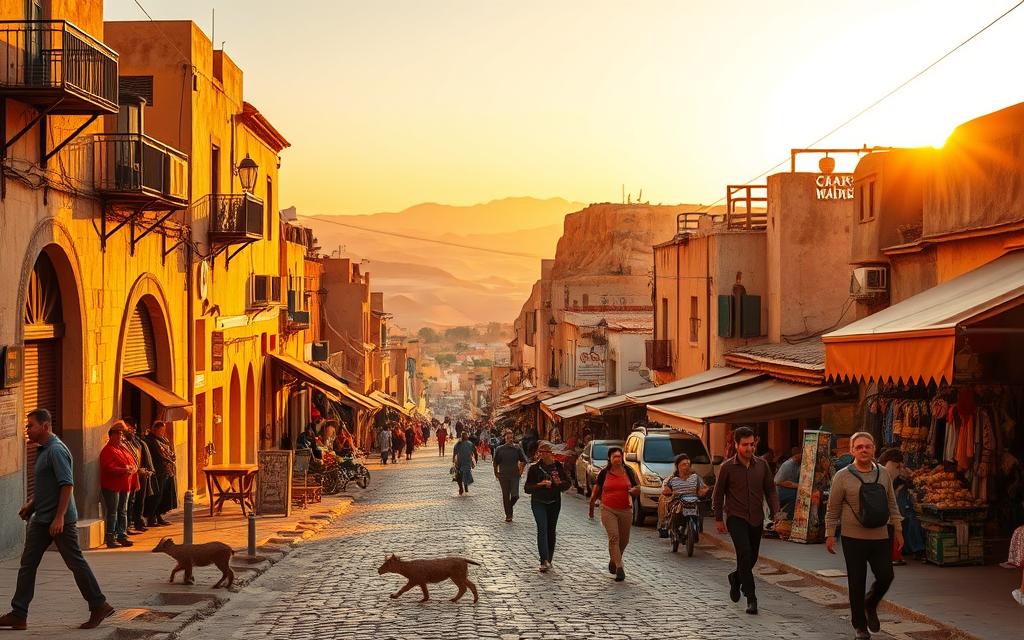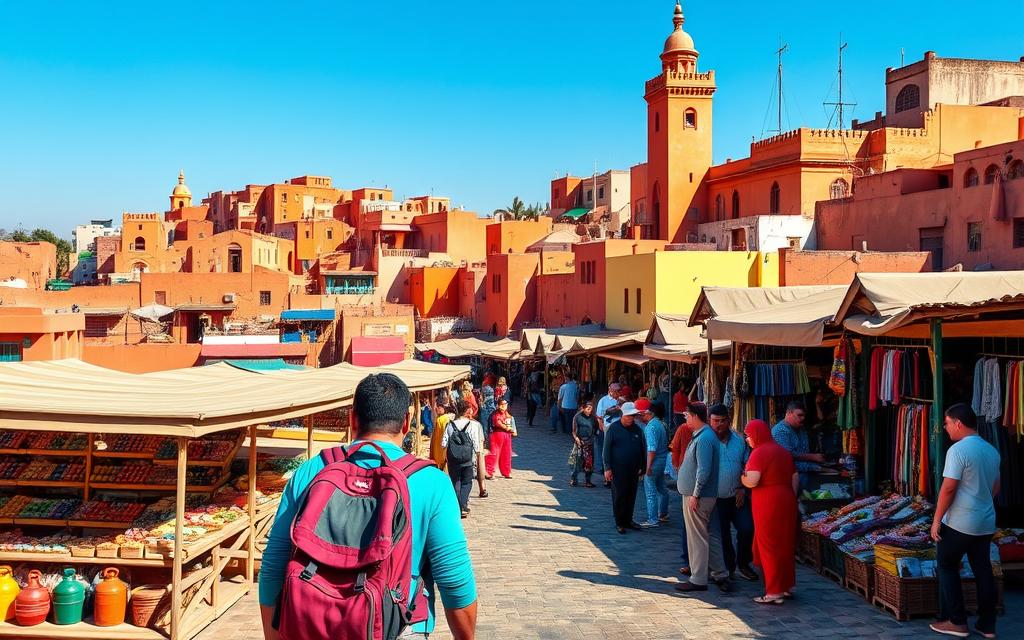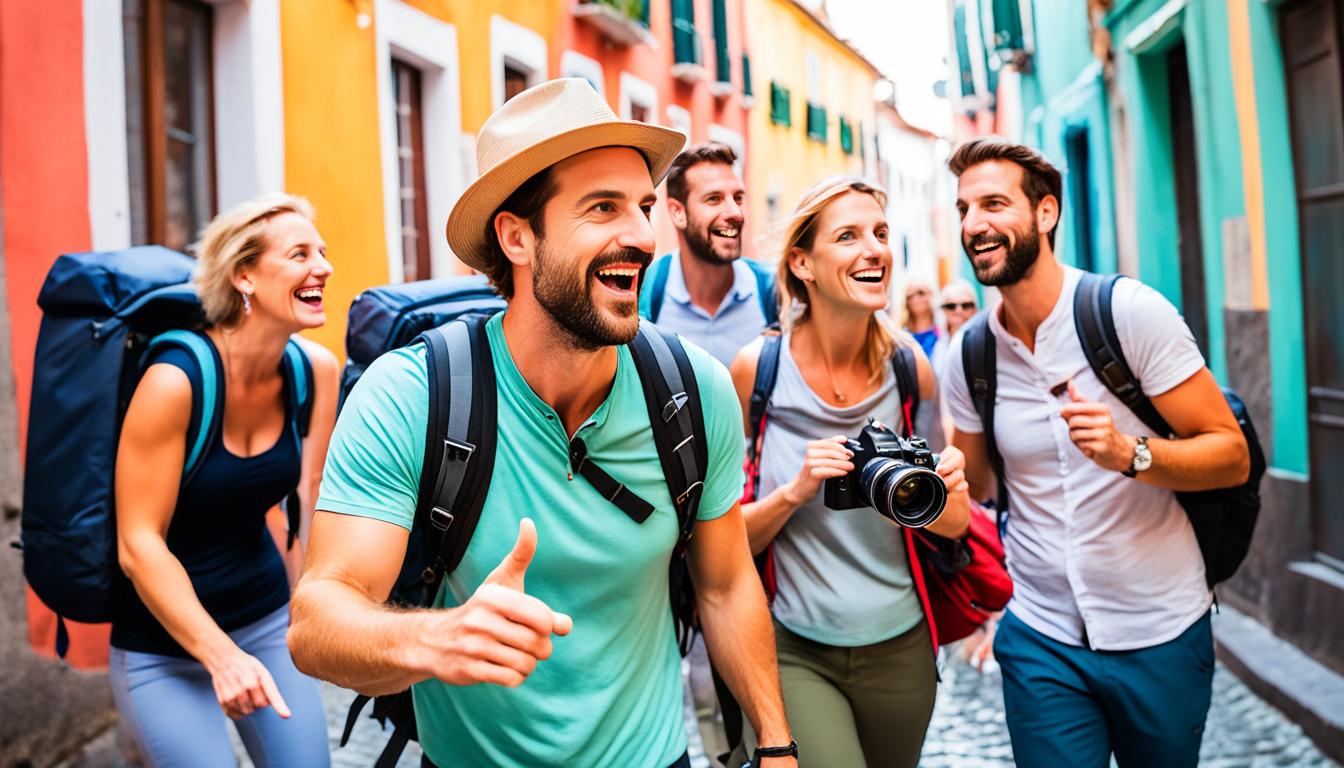Morocco is a land of contrasts, full of vibrant souks and calm coastal drives. It’s a place that calls to adventurers. But, many wonder if it’s safe for backpackers.
With over 40 million people and a GDP of $385 billion, Morocco has a well-developed tourist industry. This means visitors are generally safe.
The U.S. Department of State has a “Level 2” safety advisory for Morocco. This is because of possible terrorist threats, especially in places tourists like to go. But, the biggest worry for solo travelers is petty theft.
Even though Marrakech and Tangier are mostly safe, it’s important to stay careful. Watch out for pickpockets and scams.
Female travelers might face harassment. It’s best to avoid dark places at night and use ATMs in daylight. Morocco’s mix of cultures offers a unique experience. But, being aware and cautious is key to a safe and memorable trip.
Overview of Backpacking in Morocco
Morocco is a top spot for backpackers looking for unique attractions for adventurous travelers. It has everything from the Atlas Mountains to the Sahara Desert. Cities like Marrakech and Chefchaouen mix culture with stunning views.

Traveling in Morocco is easy and cheap. You can fly in on budget airlines like EasyJet and RyanAir. Plus, you can stay visa-free for up to 90 days. The currency is easy to handle, with 10 dirhams about equal to 1 USD.
The best times to visit are spring (April to May) and fall (September to November). These seasons are great for outdoor fun and exploring. Morocco offers everything from sandboarding to climbing Mount Toubkal, the highest peak in North Africa.
Understanding Moroccan culture is key. The country is deeply Islamic, so it’s important to respect local customs. Wearing modest clothes and being respectful can really help you connect with the culture.
- Marrakech: A hub for exploring the Medina, enjoying street food, and admiring traditional Moroccan art and architecture.
- Chefchaouen: Known for its blue-painted streets and relaxed atmosphere.
- Taghazout: A backpacker’s paradise, especially famous among surfers.
- Fez: Home to the world’s largest medina, offering a unique glimpse into Moroccan history.
- Essaouira: A laid-back coastal town on the Atlantic, perfect for those seeking serenity and great surf.
- Ait Ben Haddou: A UNESCO World Heritage site featured in many Hollywood films like Gladiator and Game of Thrones.
Morocco is great for adventures like exploring the Sahara Desert. You can also rock climb in the Todgha Gorge or sandboard and snowboard in different terrains. Travel insurance and local SIM cards are affordable, making it safe and easy to stay connected.
Many languages are spoken in Morocco, including Moroccan Arabic, French, Amazigh, and English in tourist areas. This makes it easier for travelers to communicate.
Morocco is a top choice for adventurers. It has amazing landscapes, rich culture, and exciting outdoor activities. For those seeking unique attractions for adventurous travelers, Morocco is a treasure trove.
Safety Considerations for Travelers
Exploring Morocco can be great if you know what to watch out for. Crime rates have dropped, but it’s still important to stay alert. Petty crimes like scams and pickpocketing are more common than violent crimes.

- Solo female travelers should be extra careful. While serious problems are rare, unwanted attention can happen. Dress modestly, avoid walking alone at night, and keep a low profile to stay safe.
- It’s key to know the local laws and customs. Drinking in public can get you in trouble. Also, Morocco doesn’t allow same-sex relationships, so it’s important to respect local values.
The U.S. Department of State rates Morocco a level-2 for safety due to COVID-19 and terrorism. This means you should be careful, especially in places where tourists gather.
- Getting travel insurance is a good idea to cover unexpected costs. Keep your passport and valuable items safe, like in a hotel safe. Carry photocopies of important documents too.
- Be careful of scams, like unsolicited services or tea offers. Saying no politely can help avoid extra charges. Always agree on taxi prices before you get in to avoid being overcharged.
Morocco is a fascinating place with its rich culture and lively medinas. But, it’s important to respect local traditions and be aware of potential dangers. This way, you can have a safe and fun trip.
Health and Wellness Tips
Traveling to Morocco is exciting, but staying healthy is key. Make sure you have the recommended vaccinations and medications before you go. It’s wise to get vaccinated for Hepatitis A and B, as these viruses are more common in places with poor sanitation.
Also, if you’re going to remote areas or doing activities like trekking, get rabies and tetanus shots. Rabies comes from animal bites, and tetanus from dirty cuts. Getting these shots can save your life.
Don’t forget to pack for common health issues like altitude sickness or dengue fever. Mosquito bites can spread dengue fever in cities. A medical kit with antipyretics and anti-diarrheals can help with minor problems.
Getting travel insurance, like SafetyWing, is a good idea. It covers medical costs and evacuations. This is especially important for risky activities like hiking or surfing. Health insurance for travel ensures you get the care you need without worrying about the cost.
Morocco’s weather can be very hot, especially in the desert. Drinking plenty of water is crucial to avoid dehydration. Wear hats, sunglasses, and sunscreen to protect yourself from the sun.
| Vaccine Type | Transmission Method | Recommended For |
|---|---|---|
| Hepatitis A & B | Blood and bodily fluids | All travelers, especially those with medical conditions |
| Rabies | Infected animal saliva | Travelers in remote areas, trekkers |
| Tetanus | Contamination of wounds | All travelers, recommended boosters |
| Typhoid | Contaminated food and water | Travelers in areas with poor sanitation |
| Dengue Fever | Mosquito bites | Urban area travelers, no vaccine available |
In conclusion, following these health tips, including getting the right vaccinations and medications, will help you enjoy Morocco more. Stay safe and have a great trip!
Accommodations and Transportation Safety
When visiting Morocco, it’s important to stay safe in both your accommodations and transportation. The country welcomes over 10 million tourists each year. Here are some tips to help you stay safe during your trip:
Choosing the right hostels and guesthouses is key. Look for places with good reviews from other travelers. Staying in areas close to tourist spots is also a good idea. These safe choices for hostels and guesthouses help ensure a worry-free stay, especially for solo travelers.
Public transport in Morocco, like trains and registered taxis, is usually safe and reliable. Using these options can help avoid risks. Avoiding unmarked taxis is especially important to stay safe.
It’s important to know how to use local transport in Morocco. Try to avoid traveling at night to stay safe. Solo female travelers should be extra careful outside tourist areas to avoid safety issues.
| Accommodation Type | Safety Features | Recommended Locations |
|---|---|---|
| Hostels | 24-hour Security, Lockers | Marrakech, Fez |
| Guesthouses | Private Rooms, Secure Entry | Chefchaouen, Essaouira |
While petty crimes like scams and pickpocketing are common, violent crimes against tourists are rare. Moroccans are known for their hospitality. Still, it’s smart to stay alert, especially in crowded places like markets and squares.
By picking safe choices for hostels and guesthouses and following safe transport practices, you can enjoy Morocco without worry. Whether you’re exploring the lively souks or the peaceful Atlas Mountains, being informed and cautious makes for a memorable trip.
Tips for a Safe and Enjoyable Experience
Discover Morocco’s charm by making your trip safe and fun. Start by being respectful to locals. Knowing cultural norms and being polite can make your trip better. For example, in Marrakesh Medina, it’s common to negotiate prices.
Smart packing is also important. Morocco has its own customs, so wear clothes that cover your shoulders and knees. Pack essentials like travel documents, medicines, and sun protection. Also, download travel apps for maps and language help, especially in places like the Atlas Mountains.
Staying healthy is key. Drink bottled water to avoid getting sick. Try local foods like Tagine and couscous, which are tasty and affordable. But, choose restaurants carefully, especially in places like Essaouira and Fez, to avoid food sickness. With good planning, respect for local culture, and health care, your Moroccan trip will be safe and enjoyable.
Source Links
- https://www.globalguardian.com/global-digest/is-morocco-safe
- https://www.thebrokebackpacker.com/is-morocco-safe/
- https://thepartyingtraveler.com/2023/04/05/complete-backpackers-travel-guide-morocco/
- https://www.thebrokebackpacker.com/backpacking-morocco-travel-guide/
- https://www.nomadicmatt.com/travel-blogs/safety-in-morocco/
- https://www.bhtp.com/blog/is-it-safe-to-travel-to-morocco-2022-update/
- https://www.fitfortravel.nhs.uk/destinations/africa/morocco
- https://www.theglobetrottergp.com/backpacking-in-morocco/
- https://www.journalofnomads.com/is-morocco-safe/
- https://www.gov.uk/foreign-travel-advice/morocco/safety-and-security
- https://www.foratravel.com/the-journal/is-morocco-safe
- https://www.thefamilyvoyage.com/traveling-to-morocco-advice/
- https://travelnoire.com/is-morocco-safe-what-you-need-to-know-before-traveling

